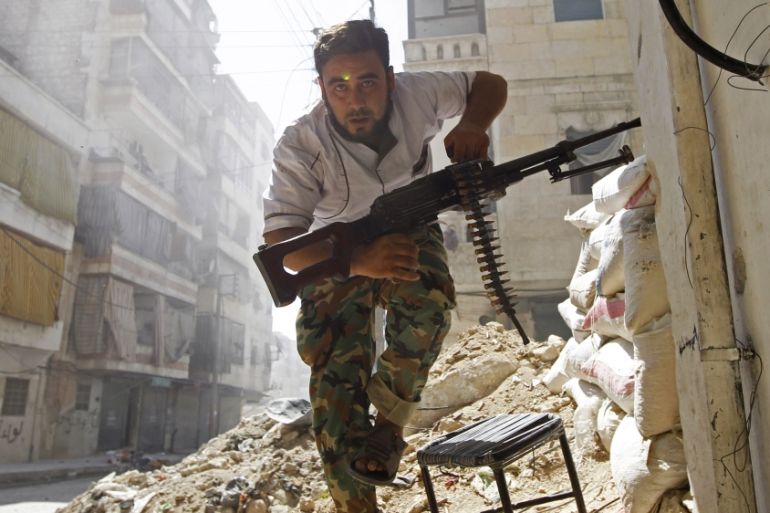US drops weapons to rebels battling ISIL in Syria
US sends arms to rebel units in Aleppo province while UN considers dropping food and medicine to besieged areas by air.

The US has reportedly dropped weapons to rebel fighters in Syria as the UN Security Council considers dropping food and medicine by air to civilians.
Witnesses say the US delivered the weapons to armed units battling the Islamic State of Iraq and the Levant (ISIL, also known as ISIS) group in Syria.
Keep reading
list of 4 itemsThe Take: Thirteen years later, has the world forgotten Syria?
Jordan army kills drug runners at Syria border amid soaring Captagon trade
Assad arrest warrant: ‘Hope and pain’ for Syrian chemical attack survivors
|
|
The developments come as a former Russian diplomat tells Al Jazeera that his country is seriously considering putting boots on the ground in Syria.
The weapons supplies were airdropped to rebels in Marea, a town in the northern province of Aleppo, on Friday, the Syrian Observatory for Human Rights (SOHR) said.
“Coalition airplanes dropped … ammunitions, light weapons and anti-tank weapons to rebels in Marea,” Rami Abdel Rahman, the SOHR head, said.
He said it was the first time the coalition had made such a drop to rebel fighters other than the Kurds.
A US defence official confirmed to the AFP news agency that the airdrop took place but denied that they included light weapons or anti-tank weapons.
In recent days, fighting has intensified near Marea, with the UN sounding a warning over the fate of an estimated 8,000 Syrians trapped by the violence.
READ MORE: In Raqqa, support ISIL or die
About 2,000 people had managed to leave Marea and Sheikh Issa before the closure of a main road between Marea and Azaz, two main rebel bastions in the province.
The airdrops come as the Syrian Democratic Forces (SDF) – a US-backed coalition of armed groups led by the Kurdish People’s Protection Units (YPG) – mobilises in Aleppo around the border town of Manbij, a suspected supply route for ISIL.

The US sees the SDF – which was founded in Syria’s mainly Kurdish northeastern region in October 2015, and is made up of at least 15 armed factions, mostly fighters from the YPG and the Free Syrian Army – as the most effective group challenging ISIL in Syria.
Meanwhile, there is speculation that Russia might deploy ground forces in Syria.
“This is under discussion; there are plans for this,” Andrei Fyodorov, a former Russian deputy minister for foreign affairs, told Al Jazeera.
INTERACTIVE: What’s left of Syria?
The reinforcements could be special forces or volunteer soldiers who are willing to fight alongside the Syrian army and its allies.
In a separate development, Syria has given the UN and the Red Cross approval to send humanitarian aid convoys into at least 11 of 19 besieged areas.
In a statement on Thursday, the Syrian Mission to the UN named the besieged areas of Kafr Batna, Saqba, Hammura, Jisrein, Zabadin, East Harasta, Zamalka, Madaya, Fouaa, Kefraya and Yarmouk on its approved list, along with some 25 other areas.
|
|
It also named two other besieged areas – Daraya and Douma – on a list of eight places approved to receive medical assistance, school supplies and milk for children.
Daraya has not received food since 2012 and was not on the Syrian list of approved destinations for humanitarian relief convoys.
However, there are serious concerns about how plausible the Syrian plan is.
On Friday the Security Council is due to hold an emergency meeting to discuss airdrops to besieged areas as the UN faces more delays in getting aid to civilians.
The International Syria Support group, which includes Russia and the US, has said airdrops should start if land access is denied.
Across Syria, an estimated 1.9 million people live in besieged areas, according to the aid group Doctors Without Borders.
Syria’s conflict started with mostly unarmed demonstrations against President Bashar al-Assad in March 2011.
It has since evolved into a full-on civil war that has killed at least 270,000 people, according to the SOHR.